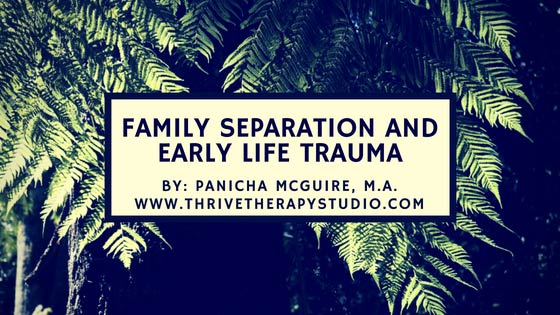Family Separation and Early Life Trauma

By now, you’ve probably heard about the children being separated from their families at the US-Mexico border. Just to be clear, there is no official Trump administration policy stating that families entering the U.S. without papers are to be separated. The “zero tolerance policy” is that all adults entering the U.S. illegally are to be criminally prosecuted; however, when these adults are sent before a judge to see if they will be deported or sent to federal jail, that’s when separation happens. So, while the parents await to see what happens to them, the “unaccompanied children” have to be dealt with. Children are then separated and transferred to the Office of Refugee Resettlement (ORR) in the Department of Health and Human Services (HHS). Most children do not have relatives already in the U.S. so they are placed in short-term shelters or foster families since criminal defendants don’t have a right to have their children with them in jail.
Now politics aside, we cannot ignore that separating children from their parents has several psychological and even biological implications. Forced separation places children at a high risk for mental health issues. The trauma of being separated from their parents or family members only adds to the stressful experiences they have already endured in order to arrive at the border. The accumulated stress from these traumatic experiences disrupts their brain development, and the effects can unfortunately last a lifetime.
Parents are essential in fulfilling the child’s fundamental needs for early attachment, or parent-child bond. In my work with attachment, being deprived from parental care (even if children are placed in stable and loving families) can cause both short term and long term biological and psychological issues. This disruption in attachment creates a belief system that their parents are unreliable and that the world is unpredictable, which can become problematic. In the short-term, these children are at a higher risk for problems with sleep, impulsivity, emotion regulation, anxiety, and depression. The long-term implications are impaired cognitive functioning and social-emotional functioning, and the increased risk of developing mental health disorders such as post-traumatic stress disorder, severe anxiety disorders, depression, and the list continues. The consequences of family separation are profound; so, if you are personally affected or would simply like to take action, please check out the resources below.
- Contact your Senators and Representatives to urge them to support the Keep Families Together Act(SB3036), a bill that would stop family separation.
- Call your members of Congress at 202-224-3121. There are a few pauses, but don’t hang up, wait for the audio recordings and follow the prompts to get connected. When connected, say you support SB 3036 and you are asking that they support it too.
- Alternatively, you can also email your senators.
- Here’s a script in case you do not know where to start.
Reach out to start
your healing journey

